七下Unit 10 I'd like some noodles. 单元复习知识点课件(共28张PPT)
文档属性
| 名称 | 七下Unit 10 I'd like some noodles. 单元复习知识点课件(共28张PPT) | 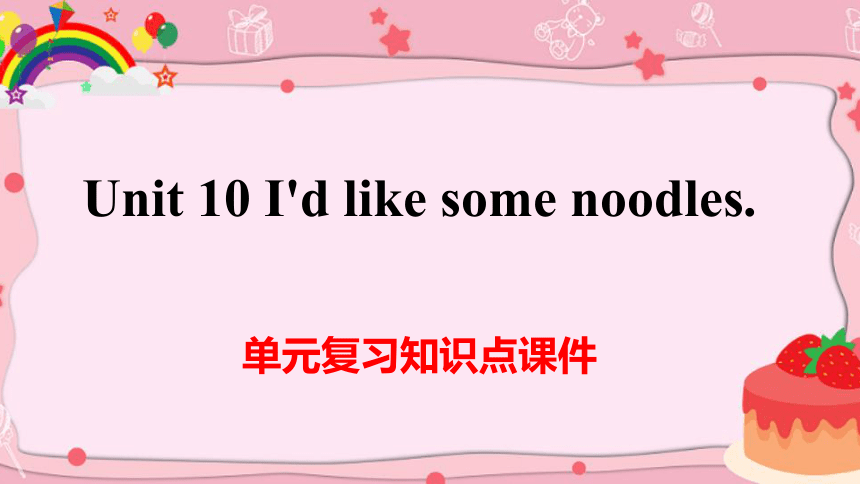 | |
| 格式 | pptx | ||
| 文件大小 | 245.3KB | ||
| 资源类型 | 教案 | ||
| 版本资源 | 人教新目标(Go for it)版 | ||
| 科目 | 英语 | ||
| 更新时间 | 2023-06-11 15:47:40 | ||
图片预览

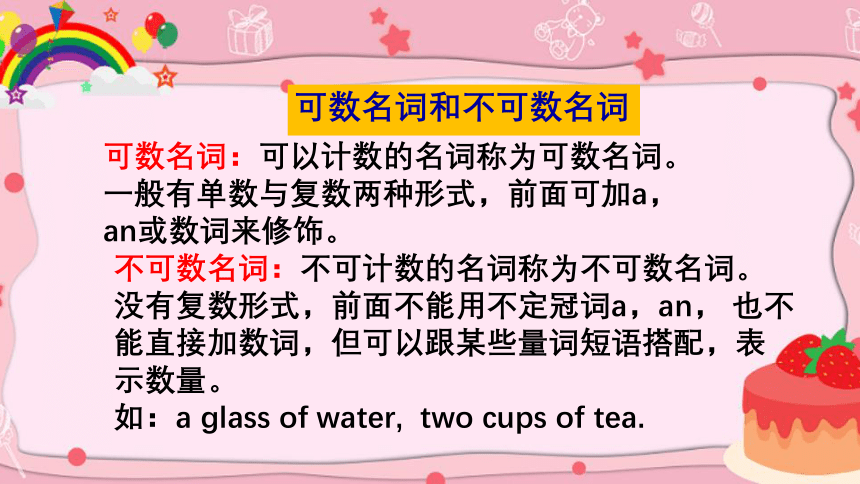
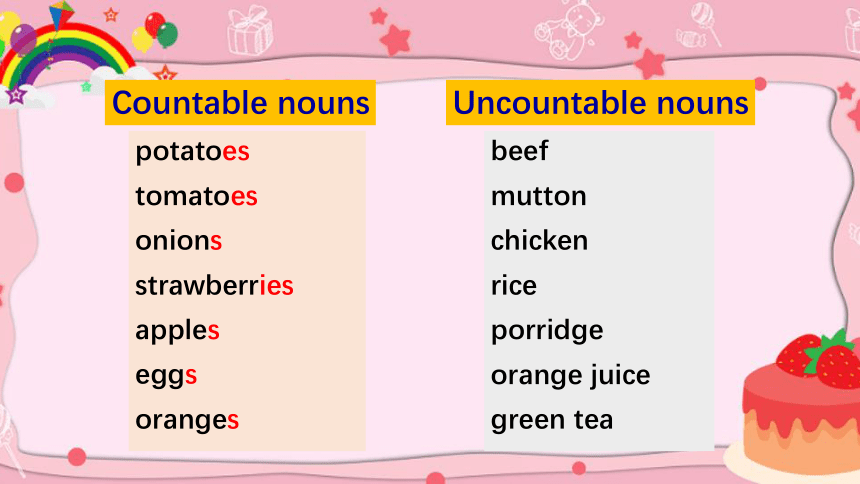
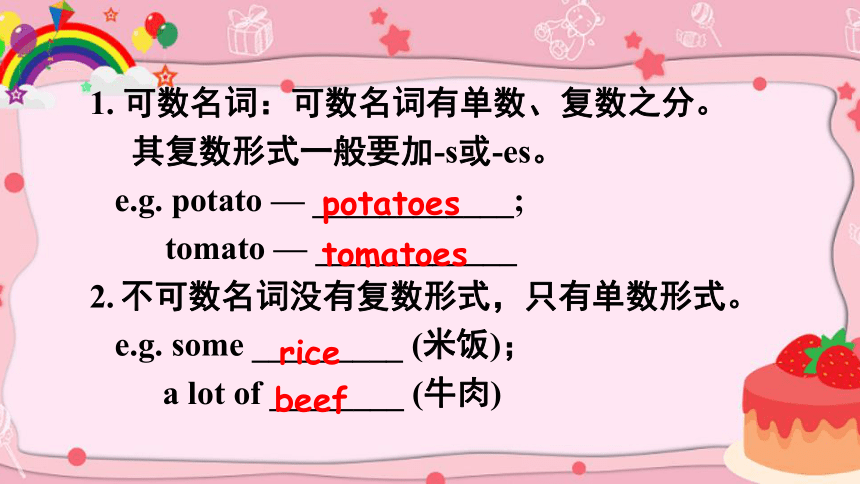
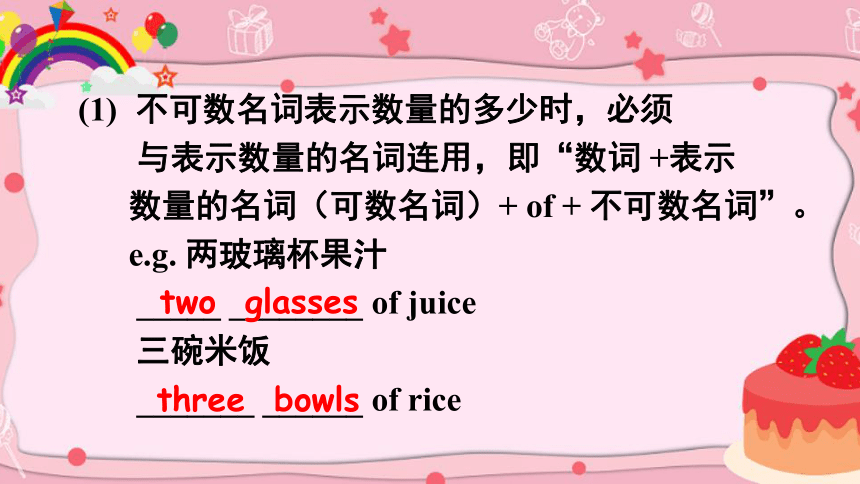
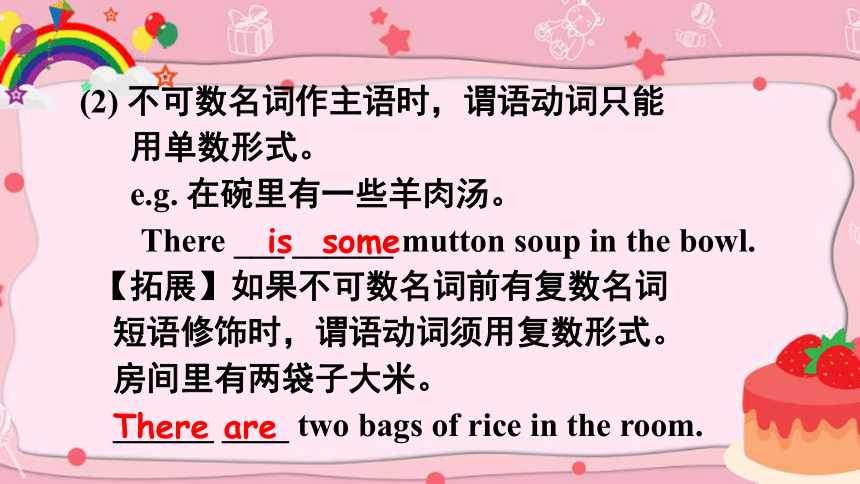
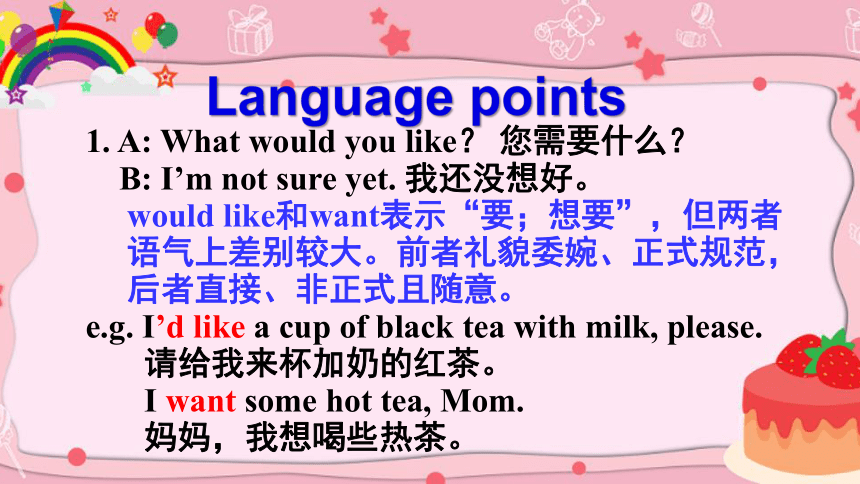
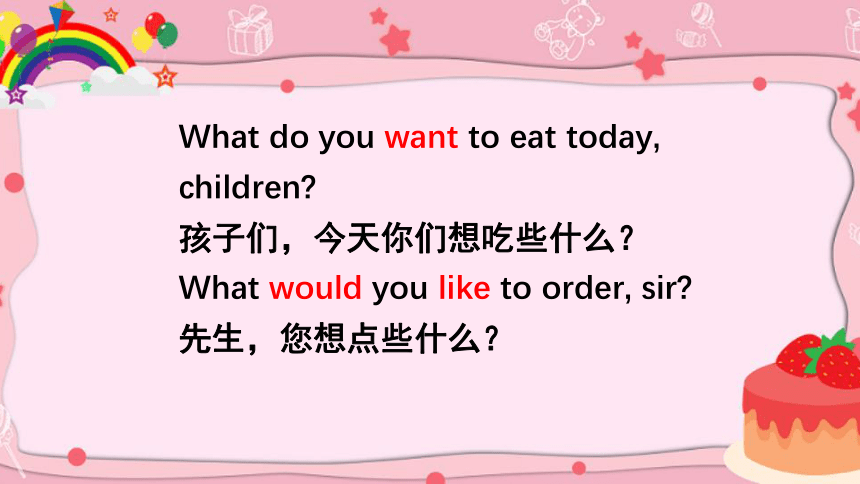
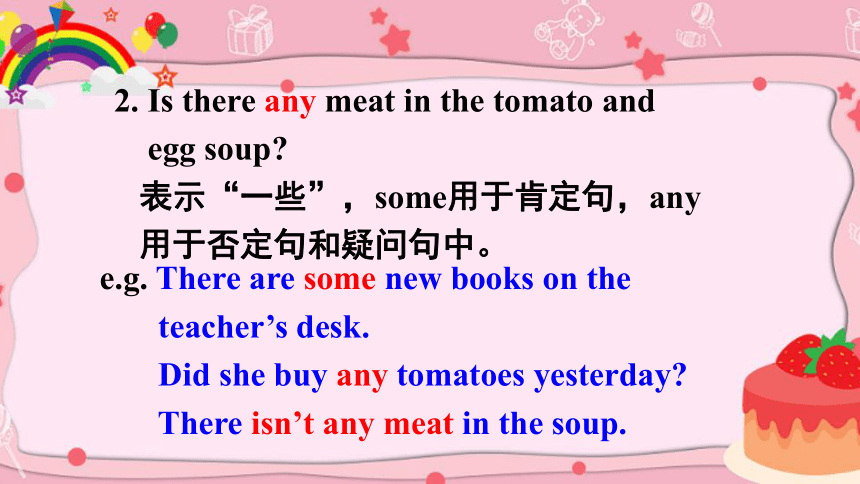
文档简介
(共28张PPT)
单元复习知识点课件
Unit 10 I'd like some noodles.
可数名词和不可数名词
可数名词:可以计数的名词称为可数名词。
一般有单数与复数两种形式,前面可加a,
an或数词来修饰。
不可数名词:不可计数的名词称为不可数名词。
没有复数形式,前面不能用不定冠词a,an, 也不
能直接加数词,但可以跟某些量词短语搭配,表
示数量。
如:a glass of water, two cups of tea.
Countable nouns
Uncountable nouns
potatoes
tomatoes
onions
strawberries
apples
eggs
oranges
beef
mutton
chicken
rice
porridge
orange juice
green tea
1. 可数名词:可数名词有单数、复数之分。
其复数形式一般要加-s或-es。
e.g. potato — ____________;
tomato — ____________
2. 不可数名词没有复数形式,只有单数形式。
e.g. some _________ (米饭);
a lot of ________ (牛肉)
rice
beef
potatoes
tomatoes
不可数名词表示数量的多少时,必须
与表示数量的名词连用,即“数词 +表示
数量的名词(可数名词)+ of + 不可数名词”。
e.g. 两玻璃杯果汁
_____ ________ of juice
三碗米饭
_______ ______ of rice
three bowls
two glasses
(2) 不可数名词作主语时,谓语动词只能
用单数形式。
e.g. 在碗里有一些羊肉汤。
There ___ ______ mutton soup in the bowl.
【拓展】如果不可数名词前有复数名词
短语修饰时,谓语动词须用复数形式。
房间里有两袋子大米。
______ ____ two bags of rice in the room.
is some
There are
1. A: What would you like? 您需要什么?
B: I’m not sure yet. 我还没想好。
would like和want表示“要;想要”,但两者
语气上差别较大。前者礼貌委婉、正式规范,
后者直接、非正式且随意。
e.g. I’d like a cup of black tea with milk, please.
请给我来杯加奶的红茶。
I want some hot tea, Mom.
妈妈,我想喝些热茶。
Language points
What do you want to eat today,
children
孩子们,今天你们想吃些什么?
What would you like to order, sir
先生,您想点些什么?
2. Is there any meat in the tomato and
egg soup
表示“一些”,some用于肯定句,any
用于否定句和疑问句中。
e.g. There are some new books on the
teacher’s desk.
Did she buy any tomatoes yesterday
There isn’t any meat in the soup.
3. What kind of noodles would you like
kind 在此句中作“种类”讲,a kind of
“一种”,all kinds of “各种各样的”。
kind of “有几分”
e.g. A cat is a kind of animal. 猫是一种动物。
The cat is kind of smart. 这只猫有几分机灵。
4. May I take your order /Can I help you
1) 这都是服务用语,可根据不同的服务场合
翻译成不同的意思。如:在餐馆, 都可以用,
翻译成:“你想吃点什么?”,
在商店,用后者,则是“你想买点什么?”
2) 类似的服务用语还有What can I do for
you 此句的本义为: “我能为你做点什么?”
它与Can I help you 是同义句。
5. What size would you like 你要多大的?
size n. (尺寸、体积、规模、身材等的)大小;
(数量的)多少;(衣服、鞋帽的)尺码
e.g. take the size of a box 量箱子的尺寸
houses of all sizes 大大小小的房子
boys of all the same size
一样个头的男孩子们
What size of shoes do you want
你要多大号码的鞋子?
some和any 既可以修饰可数名词又可以修
饰不可数名词, some常用在肯定句中,而
any则常用在否定和疑问句中。所以, some
和 any 的区别在于: some和any 的用法主要
是考虑用在肯定句、疑问句还是否定句中,与名词的可数与否无关。
6. some和any的用法
some的用法: some意为“一些”,可作形
容词和代词。它常修饰可数名词复数。
e.g. some books 一些书,
some boys 一些男孩,
也可修饰不可数名词:
some water 一些水 some tea 一些茶叶
some 常用在肯定句中。
any的用法: any意为“任何一些”,它也
可修饰可数名词复数或不可数名词,常
用于疑问句和否定句。
e.g. I can’t see any tea. 我没看见茶叶。
Do you have any friends at school
你在学校有一些朋友吗
但在表示建议,反问,请求的疑问句中,或
期望得到肯定回答时,多用some而不用any。
e.g. Would you like some coffee
你要不要来点咖啡?
How about some fruit juice
来点水果汁如何?
当any表示“任何”的意义,起强调作用
时,它可以用在肯定句中;
e.g. Any student can answer this question.
任何学生都可以回答这个问题。
7. around the world 意为“世界各地”。
e.g. He would like to take a trip around
the world.
他想环游世界。
8. The answer would be different in different countries.
不同国家,答案也不相同。
different 是形容词,意为“不同的”。
e.g. They’re in different classes.
他们在不同的班级。
【拓展】
differently 是副词,意为“不同地”。
e.g. They think differently. 他们的想法不同。
9. The number of the candles is the
person’s age.
蜡烛的数量是这个人的岁数。
the number of 意为“……的数目”,当其作
主语时,谓语动词应用单数形式。
e.g. The number of the students in our class is
forty.
我们班里学生的数目是四十人。
【拓展】
a number of 意为“很多的;大量的”,
后跟可数名词复数形式。
e.g. A number of people are in the park today.
今天有很很多人在公园里。
4. age 意为“年龄”
e.g. What’s his age = How old is he
他多大年龄?
10. If he or she blows out all the candles
in one go, the wish will come true.
如果他(她)一口气把蜡烛全部吹灭的话,许的愿
望便会成真。
1) in one go 相当于汉语中的“同一次”,“一次性地”,其中的介词还可以用at,即at one go。
e.g. You can’t do the work all in one go.
你不可能一次把工作都干完。
2) come true 表示愿望、梦想等的“实现”或
“成为现实”。
e.g. Make a wish, and it can really come true.
许个愿,它一定会实现的。
Keep on working and your dream
will come true.
不断干下去,你的梦想会实现的。
11. The child with the candy is lucky.
得到糖的小孩是幸运的。
lucky 形容词, 意为“幸运的”;而
luck 是名词,意为“运气”。
e.g. She’s really a lucky girl.
她真是一个幸运的女孩。
Eggs are a symbol of life and good luck.
鸡蛋是生命和好运的象征。
Ⅰ.单项选择。
1. --Would you like some more
-- _____. I’m full.
A. Yes, please B. I’d love to
C. No, I would not D. No, thanks
2.There are few____in the fridge. Let’s go
and buy some peas, carrots and cabbages.
A. vegetables B. fruit C. meat D. eggs
Exercises
3. -- I don’t like mutton _____ beef.
-- I don’t like mutton, _____ I like beef a lot.
A. and; but B. and; and
C. or; but D. or; and
4. Some chicken _____ in the bowl. And some
eggs ______ on the table.
A. is; is B. are; are C. is; are D. are; is
5. --Is that apple large --_________.
A. Yes. It’s. B. No, it’s small apple.
C. No, it isn’t. D. No, that’s a small.
6. I’d like some _____ and _____.
A. porridge; vegetable
B. broccolis; tomatoes
C. potatoes; bananas
D. French fries; orange juices
7. Andrew usually has fruit ______ dinner.
A. of B. for C. at D. with
8. -- _____ of shoes do you wear
-- Size 7.
A. What B. What size
C. What kind D. What color
9. The oranges in the store are good
______ cheap.
A. as B. or C. with D. as well as
10. --Would you like some tea --_______.
A. Yes, please. B. No, please.
C. No, I do. D. Yes, I wouldn’t
单元复习知识点课件
Unit 10 I'd like some noodles.
可数名词和不可数名词
可数名词:可以计数的名词称为可数名词。
一般有单数与复数两种形式,前面可加a,
an或数词来修饰。
不可数名词:不可计数的名词称为不可数名词。
没有复数形式,前面不能用不定冠词a,an, 也不
能直接加数词,但可以跟某些量词短语搭配,表
示数量。
如:a glass of water, two cups of tea.
Countable nouns
Uncountable nouns
potatoes
tomatoes
onions
strawberries
apples
eggs
oranges
beef
mutton
chicken
rice
porridge
orange juice
green tea
1. 可数名词:可数名词有单数、复数之分。
其复数形式一般要加-s或-es。
e.g. potato — ____________;
tomato — ____________
2. 不可数名词没有复数形式,只有单数形式。
e.g. some _________ (米饭);
a lot of ________ (牛肉)
rice
beef
potatoes
tomatoes
不可数名词表示数量的多少时,必须
与表示数量的名词连用,即“数词 +表示
数量的名词(可数名词)+ of + 不可数名词”。
e.g. 两玻璃杯果汁
_____ ________ of juice
三碗米饭
_______ ______ of rice
three bowls
two glasses
(2) 不可数名词作主语时,谓语动词只能
用单数形式。
e.g. 在碗里有一些羊肉汤。
There ___ ______ mutton soup in the bowl.
【拓展】如果不可数名词前有复数名词
短语修饰时,谓语动词须用复数形式。
房间里有两袋子大米。
______ ____ two bags of rice in the room.
is some
There are
1. A: What would you like? 您需要什么?
B: I’m not sure yet. 我还没想好。
would like和want表示“要;想要”,但两者
语气上差别较大。前者礼貌委婉、正式规范,
后者直接、非正式且随意。
e.g. I’d like a cup of black tea with milk, please.
请给我来杯加奶的红茶。
I want some hot tea, Mom.
妈妈,我想喝些热茶。
Language points
What do you want to eat today,
children
孩子们,今天你们想吃些什么?
What would you like to order, sir
先生,您想点些什么?
2. Is there any meat in the tomato and
egg soup
表示“一些”,some用于肯定句,any
用于否定句和疑问句中。
e.g. There are some new books on the
teacher’s desk.
Did she buy any tomatoes yesterday
There isn’t any meat in the soup.
3. What kind of noodles would you like
kind 在此句中作“种类”讲,a kind of
“一种”,all kinds of “各种各样的”。
kind of “有几分”
e.g. A cat is a kind of animal. 猫是一种动物。
The cat is kind of smart. 这只猫有几分机灵。
4. May I take your order /Can I help you
1) 这都是服务用语,可根据不同的服务场合
翻译成不同的意思。如:在餐馆, 都可以用,
翻译成:“你想吃点什么?”,
在商店,用后者,则是“你想买点什么?”
2) 类似的服务用语还有What can I do for
you 此句的本义为: “我能为你做点什么?”
它与Can I help you 是同义句。
5. What size would you like 你要多大的?
size n. (尺寸、体积、规模、身材等的)大小;
(数量的)多少;(衣服、鞋帽的)尺码
e.g. take the size of a box 量箱子的尺寸
houses of all sizes 大大小小的房子
boys of all the same size
一样个头的男孩子们
What size of shoes do you want
你要多大号码的鞋子?
some和any 既可以修饰可数名词又可以修
饰不可数名词, some常用在肯定句中,而
any则常用在否定和疑问句中。所以, some
和 any 的区别在于: some和any 的用法主要
是考虑用在肯定句、疑问句还是否定句中,与名词的可数与否无关。
6. some和any的用法
some的用法: some意为“一些”,可作形
容词和代词。它常修饰可数名词复数。
e.g. some books 一些书,
some boys 一些男孩,
也可修饰不可数名词:
some water 一些水 some tea 一些茶叶
some 常用在肯定句中。
any的用法: any意为“任何一些”,它也
可修饰可数名词复数或不可数名词,常
用于疑问句和否定句。
e.g. I can’t see any tea. 我没看见茶叶。
Do you have any friends at school
你在学校有一些朋友吗
但在表示建议,反问,请求的疑问句中,或
期望得到肯定回答时,多用some而不用any。
e.g. Would you like some coffee
你要不要来点咖啡?
How about some fruit juice
来点水果汁如何?
当any表示“任何”的意义,起强调作用
时,它可以用在肯定句中;
e.g. Any student can answer this question.
任何学生都可以回答这个问题。
7. around the world 意为“世界各地”。
e.g. He would like to take a trip around
the world.
他想环游世界。
8. The answer would be different in different countries.
不同国家,答案也不相同。
different 是形容词,意为“不同的”。
e.g. They’re in different classes.
他们在不同的班级。
【拓展】
differently 是副词,意为“不同地”。
e.g. They think differently. 他们的想法不同。
9. The number of the candles is the
person’s age.
蜡烛的数量是这个人的岁数。
the number of 意为“……的数目”,当其作
主语时,谓语动词应用单数形式。
e.g. The number of the students in our class is
forty.
我们班里学生的数目是四十人。
【拓展】
a number of 意为“很多的;大量的”,
后跟可数名词复数形式。
e.g. A number of people are in the park today.
今天有很很多人在公园里。
4. age 意为“年龄”
e.g. What’s his age = How old is he
他多大年龄?
10. If he or she blows out all the candles
in one go, the wish will come true.
如果他(她)一口气把蜡烛全部吹灭的话,许的愿
望便会成真。
1) in one go 相当于汉语中的“同一次”,“一次性地”,其中的介词还可以用at,即at one go。
e.g. You can’t do the work all in one go.
你不可能一次把工作都干完。
2) come true 表示愿望、梦想等的“实现”或
“成为现实”。
e.g. Make a wish, and it can really come true.
许个愿,它一定会实现的。
Keep on working and your dream
will come true.
不断干下去,你的梦想会实现的。
11. The child with the candy is lucky.
得到糖的小孩是幸运的。
lucky 形容词, 意为“幸运的”;而
luck 是名词,意为“运气”。
e.g. She’s really a lucky girl.
她真是一个幸运的女孩。
Eggs are a symbol of life and good luck.
鸡蛋是生命和好运的象征。
Ⅰ.单项选择。
1. --Would you like some more
-- _____. I’m full.
A. Yes, please B. I’d love to
C. No, I would not D. No, thanks
2.There are few____in the fridge. Let’s go
and buy some peas, carrots and cabbages.
A. vegetables B. fruit C. meat D. eggs
Exercises
3. -- I don’t like mutton _____ beef.
-- I don’t like mutton, _____ I like beef a lot.
A. and; but B. and; and
C. or; but D. or; and
4. Some chicken _____ in the bowl. And some
eggs ______ on the table.
A. is; is B. are; are C. is; are D. are; is
5. --Is that apple large --_________.
A. Yes. It’s. B. No, it’s small apple.
C. No, it isn’t. D. No, that’s a small.
6. I’d like some _____ and _____.
A. porridge; vegetable
B. broccolis; tomatoes
C. potatoes; bananas
D. French fries; orange juices
7. Andrew usually has fruit ______ dinner.
A. of B. for C. at D. with
8. -- _____ of shoes do you wear
-- Size 7.
A. What B. What size
C. What kind D. What color
9. The oranges in the store are good
______ cheap.
A. as B. or C. with D. as well as
10. --Would you like some tea --_______.
A. Yes, please. B. No, please.
C. No, I do. D. Yes, I wouldn’t
同课章节目录
- Unit 1 Can you play the guitar?
- Section A
- Section B
- Unit 2 What time do you go to school?
- Section A
- Section B
- Unit 3 How do you get to school?
- Section A
- Section B
- Unit 4 Don't eat in class.
- Section A
- Section B
- Unit 5 Why do you like pandas?
- Section A
- Section B
- Unit 6 I'm watching TV.
- Section A
- Section B
- Review of Units 1-6
- Unit 7 It's raining!
- Section A
- Section B
- Unit 8 Is there a post office near here?
- Section A
- Section B
- Unit 9 What does he look like?
- Section A
- Section B
- Unit 10 I'd like some noodles.
- Section A
- Section B
- Unit 11 How was your school trip?
- Section A
- Section B
- Unit 12 What did you do last weekend?
- Section A
- Section B
